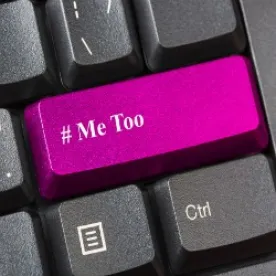For every believer, there is a skeptic.
For the better part of 25 years, I have been questioned and challenged about sexual harassment, leading (I hope) to my deeper understanding about the everyday difficulties of tackling workplace conduct. Recently, in the wake of speaking engagements, training sessions, and panel discussions, those questions have multiplied and accelerated. Most of them are thoughtful inquiries, and I never have enough time to answer them.
Here are a couple questions that I keep hearing and my theories in response.
Why do we always talk about the women? Aren’t men victims too?
Although precision is difficult and numbers vary widely, it is universally accepted that women are more likely to experience harassment in the workplace. In 2017, more than 83 percent of the sexual harassment complaints filed with the EEOC were brought by women. Anecdotally, most professional women have experienced conduct that could be described as sexually inappropriate.
That non-scientific evidence aside, one of the problems is that harassment has long been underreported. According the EEOC’s 2016 Select Task Force Report on Harassment, about 75 percent of women never formally report it. Additionally, the research of an Oklahoma State professor, Heather McLaughlin, reveals that by the age of 31, 46 percent of women will experience harassment.
And yes, men are victims, too. One-third of working men reported at least one form of sexual harassment according to a 2015 survey, in response to inquiries at Psychology Today.
For men or women, conduct that is unwelcome, severe or pervasive, or that interferes with an employee’s working environment is not acceptable. Not only is it against the law, it leads to lower productivity in the workplace.
Why did they wait so long to come forward?
This question tends to be code for “I don’t believe it,” or, “If it was true, she would have complained at the time,” or, “There must be some money in it now.”
As noted earlier, however, most women would rather not file a formal complaint of harassment. And there are many reasons: fear of retaliation, whether professionally or socially; fear of being labeled as a tattle-tale; legitimate worries that the inevitable and legally required investigation will lead to blaming the accuser. The most likely response of women to inappropriate conduct is to ignore it, do nothing, and pretend it didn’t happen.
The reason that some women are coming forward now (and trust me that many women are still not coming forward) is because courage is contagious. There is a support system of #MeToo. That does not mean that every accusation is a legally supportable claim of harassment, but it does mean that women who were once afraid, today, are less so.
When we first started examining these issues in depth several months ago, I noted the complexity of the topic and even these answers only scratch the surface. Please keep the thoughtful questions coming, and we’ll continue the conversation.




 />i
/>i

